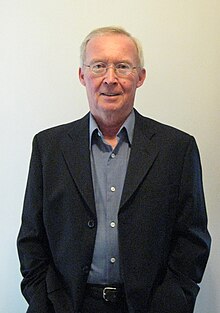William Hare (philosopher)
William Francis Hare | |
|---|---|
 | |
| Born | February 7, 1944 |
| Region | Western Philosophy |
Main interests | Philosophy of Education |
William Hare (born February 7, 1944) is a philosopher whose writings deal primarily with problems in philosophy of education. He attended Wyggeston Grammar School for Boys, 1955–62. After receiving his B.A. from the University of London (1965), he gained an M.A. in philosophy from the University of Leicester (1968), and a Ph.D. in educational theory from the University of Toronto (1971). He was Professor of Education and Philosophy at Dalhousie University from 1970 to 1995, and subsequently Professor of Education at Mount Saint Vincent University until his retirement in June 2008. He is now Professor Emeritus. He is known mainly for his work on open-mindedness, and has published several papers dealing with philosophical ideas about education in the work of Bertrand Russell.[1]
Selected books
[edit]- Open-mindedness and Education (1979)[2][3]
- In Defence of Open-mindedness (1985)[4][5]
- What Makes a Good Teacher (1993)[6][7]
Edited works
[edit](with John P. Portelli)
- Philosophy of Education: Introductory Readings (1988, 1996, 2001)[8]
- Key Questions For Educators (2005)[9]
Publications
[edit]- — (2020). "Socratic open-mindedness" (PDF). Paideusis. 18 (1): 5–16. doi:10.7202/1072334ar. S2CID 170391207.
- — (2009). "What open-mindedness requires" (PDF). Skeptical Inquirer. 33 (1): 36–39.
- — (2007). Cohen, Elliot D (ed.). "Why philosophy for educators?". International Journal of Applied Philosophy. 21 (2): 149–59. doi:10.5840/ijap20072122.
- — (2007). "Credibility and credulity: Monitoring teachers for trustworthiness". Journal of Philosophy of Education. 41 (2): 207–19. doi:10.1111/j.1467-9752.2007.00557.x.
- — (2006). "Why open-mindedness matters". Think. 5 (13): 7–15. doi:10.1017/S1477175600001482. S2CID 146668459.
- — (2004). "Assessing one's own open-mindedness". Philosophy Now. 47: 26–28. Archived from the original on 2017-07-05.
- — (2003). Cohen, Elliot D (ed.). "Is it good to be open-minded?". International Journal of Applied Philosophy. 17 (1): 73–87. doi:10.5840/ijap20031718.
- — (2001). "Bertrand Russell and the ideal of critical receptiveness". Skeptical Inquirer. 25 (3): 40–44. CiteSeerX 10.1.1.133.2811.
References
[edit]- ^ Talaska, Richard A. (1992). Critical Reasoning in Contemporary Culture. SUNY Press. pp. 112–. ISBN 9780791409794. Retrieved 5 August 2012.
- ^ O'Leary, P. T. (1981). Hare, William (ed.). "Open-Mindedness and Education". The Journal of Educational Thought. 15 (1): 82–85. ISSN 0022-0701. JSTOR 23768244.
- ^ Kazepides, Tasos (1981). "Review of Open-Mindedness and Education". Canadian Journal of Education / Revue canadienne de l'éducation. 6 (2): 141–144. doi:10.2307/1494793. ISSN 0380-2361. JSTOR 1494793.
- ^ Hart, Hendrik (1987). "In Defence of Open-MindednessWilliam Hare Kingston and Montreal: McGill-Queen's University Press, 1985. Pp. xiii, 121. 8.95 paper". Dialogue: Canadian Philosophical Review / Revue canadienne de philosophie. 26 (2): 378–380. doi:10.1017/S0012217300038361. ISSN 1759-0949. S2CID 171038279.
- ^ Ellett, Frederick S. (1987). "Review of In Defence of Open-Mindedness". Canadian Journal of Education / Revue canadienne de l'éducation. 12 (1): 256–264. doi:10.2307/1495014. ISSN 0380-2361. JSTOR 1495014.
- ^ Friesen, David W. (1994). "Review of What makes a good teacher". The Journal of Educational Thought. 28 (3): 325–328. ISSN 0022-0701. JSTOR 23767580.
- ^ Berner, Audrey (1994-01-01). "WHAT MAKES A GOOD TEACHER? (Author: William Hare)". McGill Journal of Education / Revue des sciences de l'éducation de McGill. 29 (1). ISSN 1916-0666.
- ^ Darling, Linda Farr (2006-04-30). "Review of "Philosophy of Education: Introductory Readings (3rd Edition)"". Philosophical Inquiry in Education. 15 (1): 95–101. ISSN 2369-8659.
- ^ Kerr, Donald (2006). ""Key Questions for Educators" (William Hare and John P. Portelli (Eds.))" (PDF). Paideusis. 15 (2): 107–108. doi:10.7202/1072685ar. ISSN 0838-4517.
Further reading
[edit]- Hare, W. (2010) "Following the Argument: A Philosophical Memoir" Paideusis, Volume 19 (2010), No. 2., pp. 78–85 (Open Access)
| International | |
|---|---|
| National | |
| Other | |
Text is available under the CC BY-SA 4.0 license; additional terms may apply.
Images, videos and audio are available under their respective licenses.
